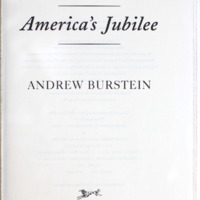-
Title
-
America's jubilee
-
Description
-
On July 4, 1826, the United States celebrated its fiftieth birthday with parades and speeches across the country. But what ultimately sanctified the national jubilee in the minds of the celebrants was an extraordinary coincidence: the nearly simultaneous deaths of Thomas Jefferson and John Adams, the last pillars of the original republic, already venerated as legends in their own time. It was a watershed in the nation's history, a bright moment when the successors to the Revolutionary dream examined their own lives as they took inspiration from and found nostalgia in the accomplishments of the founders. "In this book, the distinguished historian Andrew Burstein explores what it was to be an American in 1826. Drawing on private diaries and letters, daily newspapers, and long-buried publications, he shows us the personal lives behind the pageantry and reveals an acutely self-conscious nation - anxiously optimistic about its future, eager to romanticize the Revolutionary past." "In this portrait of the United States in its jubilee year, Burstein shows how 1826 marked an unforgettable time in the republic's history, when a generation embraced the legacy of its predecessors and sought to enlarge its role in America's story."--BOOK JACKET.
-
Identifier
-
928891
-
375410333
-
Creator
-
Burstein, Andrew
-
Format
-
1st ed.
-
Source
-
Brian Lamb Booknotes Collection
-
Gift of Brian Lamb, 2011.
-
Catalog record
-
Language
-
eng
-
Date
-
2001
-
Program air date: April 15, 2001
-
Publisher
-
A.A. Knopf
-
George Mason University. Libraries. Special Collections & Archives
-
Text
-
Transcription of Annotations
Notes on front endpapers: "Wed., 2/14, 11 a.m. - Jefferson survives; Lafayette - impatient with slavery; American Colonization Society; William Wirt, Attorney General, prosecutions of Aaron Burr. - John Adams - demanding moralist. - John Randolph duels Henry Clay; Edward Everett; George McDuffie, S.C. duel w. William Cumming. - Rumor of William Henry Harrison seducing the daughter of a Cincinnati doctor. - Song "Hail to the Chief". - Ethan Allen Brown - single - refused to take a wife. - 13,000: D.C.; 12 million people; 24 stars; 19th Congress, 6 Pres. J.Q.A.: corrupt bargain: Jackson: 43%, 99; Adams: 30%, 84; Crawford: 42; Clay: 37." -- Annotations by Brian Lamb in the margins and underlining of pertinent phrases throughout the book. - Examples: p. 32: "What distinguished the particular patriotism of the jubilee year, as we shall see, was a people's sense of their extended range. They felt growth." - p. 131: "One could anticipate a bright social future for Washington, but it was still very much a dreary, unfinished, disconnected town offering little in the way of diversion." - p. 136: "As a demanding moralist, John Adams became obnoxious to many of his colleagues ... The son would acquire the same willfulness and overall pragmatism as the father, and achieve the same irksome unpredictability in the minds of his presumed allies." - p. 138: "In the 1790's, the vice president's son proved himself every bit as dogged, moralistic, intense, and compulsive as his father." - p. 154: "John Quincy Adams, as well, lacked the ability to persuade at which Jefferson excelled." - p. 190: "Clay wanted to find a way of negotiating the gradual dismemberment of the system of American slavery." - p. 204: "...political parties no longer arose from principles but from the lure that was cast by popular men. The personalities of party "chieftains" somehow meant more to voters, while ideas had become of secondary importance." - p. 254: "Americans were a people distracted by the clashing viewpoints and malevolent passions of their leaders, but their republic seemed to these same people more secure than ever before in its fifty-year history." - p. 259: "Jefferson tried to convince Adams one last time, in December 1825, that the pleasures of their earlier years outweighed the pain." - p. 264: "Jefferson saw death "as an event rather unpleasant than terrible - like a traveller expressing his apprehension of being caught in a rain"." - p. 275: "It was, Niles asserted, ..."nearly if not precisely" the hour of Jefferson's death when the Declaration was approved, and "nearly, if not precisely" the same hour that Adams died when the Declaration was "first proclaimed"." - p. 277: "And so old Adams is dead; on the 4th of July, too, just half a century after our Declaration of Independence; and leaving his son on the throne. This is Euthenasia, indeed. They have killed Mr. Jefferson, too, on the same day, but I don't believe it." - p. 304: "What is there, finally, to be said of the Americans of 1826? They were, first and foremost, acutely aware of themselves as the immediate successors of the founding generation."
-
Subject
-
"United States. Declaration of Independence--Anniversaries, etc."
-
"Whitman College--Authors, Faculty."
-
"Eighteen twenty-six, A.D."
-
Relation
-
Original Booknotes interview
-
Rights
-
This work may be protected by copyright laws and is provided for educational and research purposes only. Any infringing use may be subject to disciplinary action and/or civil or criminal liability as provided by law. If you believe that you are the rights-holder and object to Mason’s use of this image, please contact speccoll@gmu.edu.
 928891.pdf
928891.pdf